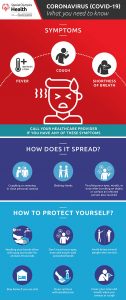Coronavirus (COVID-19) Outbreak: What You Need to Know

What is coronavirus disease 2019 (COVID-19)?
Coronavirus COVID-19 is a lung illness that can spread from person to person. The virus that causes COVID-19 is a new coronavirus that was first discovered in Wuhan, China.
Have there been cases of COVID-19 among Special Olympics athletes?
The first case of COVID-19 in an athlete in the United States was reported on 7 March 2020. At Special Olympics, we are doing everything we can to provide information and assist in preventing COVID-19. You can find the current global count of cases of COVID-19 on the website of the World Health Organization, and the CDC website for the United States.
How does COVID-19 spread?
The virus spreads from an infected person to others through:
- The air by coughing and sneezing.
- Close personal contact, such as touching or shaking hands.
- Touching an object or surface with the virus on it, then touching your mouth, nose, or eyes before washing your hands.
What are the symptoms of COVID-19?
Patients with COVID-19 have mild to severe respiratory illness with symptoms of:
- Fever
- Cough
- Shortness of breath
Most people with COVID-19 will have a mild illness, but some people will get sicker and may need to be hospitalized. If you are 60 years or older, are pregnant, or are chronically ill (have lung, heart or kidney disease), contact your physician’s office so that they can monitor your health more closely or test you for COVID-19.
What are severe complications from this virus?
Some people have gotten pneumonia in both lungs, some have gotten hospitalized and a small number have died from COVID-19. People who are older (over 60), are pregnant or are chronically ill (have lung, heart or kidney disease) are at higher risk of those complications.
How can I help protect myself?
Here is a video and simple everyday actions to help prevent the spread of coronavirus:
- Avoid close contact with people who are sick. This generally means staying six feet (or about two meters) away.
- Avoid touching your eyes, nose, and mouth with unwashed hands.
- Stay home when you are sick.
- Cover your cough or sneeze with a tissue, then throw the tissue in the trash.
- Clean and disinfect frequently touched objects and surfaces using a regular household cleaning spray or wipe.
- Wash your hands often with soap and water for at least 20 seconds. Use an alcohol-based hand sanitizer that contains at least 60% alcohol if soap and water are not available.
Should I wear a mask when I go out in public?
Governor Andy Beshear has advised all Kentuckians to wear masks in public to protect themselves and others from COVID-19.
If you have a fever, cough or shortness of breath, and you suspect you might have been exposed to COVID-19, you should:
Call your healthcare provider and they can help you decide if you need to be evaluated in person. If you believe this is a medical emergency, call 911 and notify the dispatch personnel that you may have been exposed to COVID-19. If possible, put on a face mask before emergency medical services arrive or immediately after they arrive.
What should I do if I have been in close contact with someone with COVID-19 but I am not sick?
You should monitor your health for fever, cough and shortness of breath for 14 days from your last close contact with the person who has COVID-19. You should not go to work or school, and should avoid public places for 14 days.
Is there a treatment?
There is no specific treatment for COVID-19 that will cure the virus. People with COVID-19 can seek medical care to help relieve symptoms.
Should I still attend Special Olympics events or practice?
Currently all Special Olympics activities including practices, competitions and social activities are suspended.
Are individuals with intellectual disabilities at increased risk for COVID-19?
Individuals with intellectual disabilities who have existing medical conditions, including breathing problems, are at increased risk for COVID-19.
What is Special Olympics doing to prevent the spread of COVID-19 during events?
Special Olympics Programs have suspended all activities worldwide. In Kentucky that suspension currently runs until at least June 15.

